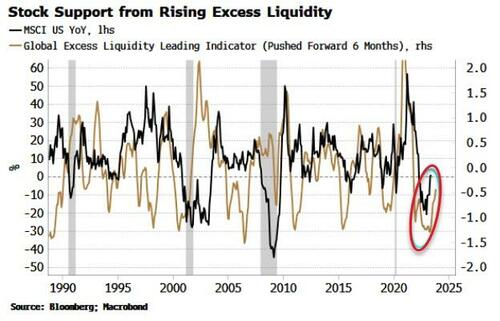Rising Excess Liquidity Resolves Risk Asset-Recession Paradox
Authored by Simon White, Bloomberg macro strategist,
The seeming paradox between an increasingly recessionary economy and a resilient stock market can be explained by rising excess liquidity.
Jobless claims data on Thursday continued to point in a recessionary direction. Yet, as always with this data, more information is gleaned by looking at it on a state level.
On that basis, claims data continues to worsen. Recessions are pervasive deteriorations in activity at a sectoral and geographical level. When a rising number of states sees claims rising at a high rate, it is often a sign a recession is very close.
The percentage of states with continuing claims that are rising rapidly on an annual basis keeps climbing. On an unsmoothed basis, the percentage rose to 39% from 30% last week.
As the chart below shows, when this percentage rises above 15-20% it tends to spike much higher, and this has always previously coincided with an NBER-defined recession.
Initial claims behave similarly to continuing claims, and we are seeing the same picture there.
About a quarter of states are seeing their initial claims rising rapidly – above the threshold that has typically preceded a recession.
But the market continues to seem blissfully indifferent.
This might not make sense, until you look at excess liquidity. As a reminder, excess liquidity is the difference between real money growth and economic growth, and one of the best medium-term leading indicators for stocks.
Global excess liquidity has started to rise from depressed levels as inflation and growth are falling, “freeing up” asset-supporting liquidity.
The market is being driven by a very narrow band of stocks.
Intuitively this may seem like a source of weakness rather than strength, but on previous occasions where the largest five stocks were outperforming the main index as much as they are today, it has led to further index outperformance.
The largest stocks are overbought on an individual basis using traditional measures such as RSIs, stochastics or Bollinger bands.
But the Top 5 stocks as a market-cap weighted index is in the process of rebounding from extremely oversold levels, meaning it can keep rising before it looks overbought.
If excess liquidity keeps rising – as it should do as growth and inflation continue to slow as we near the end of the cycle – it is quite conceivable a recession does not cause as much damage to equities as would normally be expected.
Tyler Durden
Fri, 06/09/2023 – 10:25
via ZeroHedge News https://ift.tt/KeTaIgN Tyler Durden


